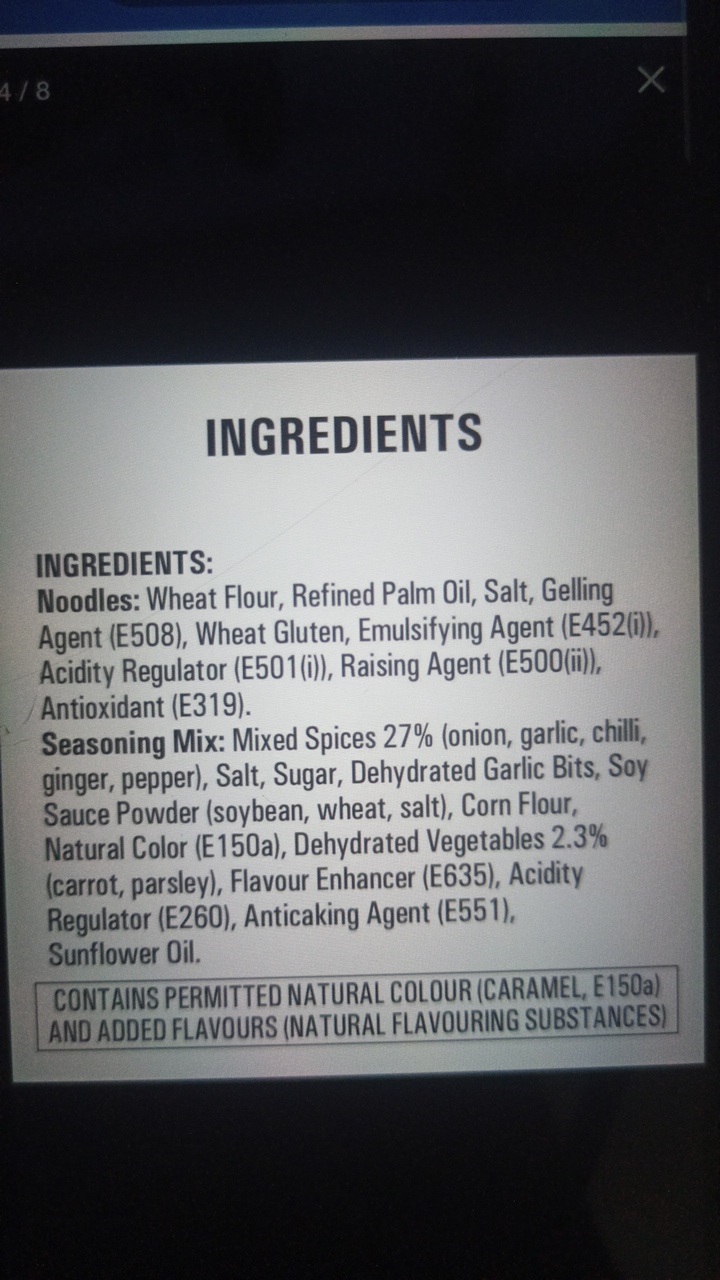
Barcode: 8901595033317
noodles
HALAL
📝 Reason: Most of the listed ingredients are plant-based or mineral, and the ECodes (like E508, E452(i), E501(i), E500(ii), E319, E150a, E260, E551) appear in the Halal list provided. However, E635 (Disodium 5′-ribonucleotides) can be derived from either plant or animal sources. Without explicit confirmation of vegetarian/plant origin or Halal certification, and according to IFANCA and other Halal authorities, it is considered Doubtful (Mashbooh). The entire product is classified as Doubtful when any ingredient’s Halal status is uncertain (Quran 5:3: avoid doubtful or haram ingredients; see IFANCA.org and www.foodchemadditives.com).
🏷️ Category: Noodles
📄 Certificates: Contains Permitted Natural Colour (Caramel, E150A), And Added Flavours (Natural Flavouring Substances), Vegetarisch
Ingredients:
Details
Understanding the Halal Status of Noodles
The Halal status of food products is essential for many consumers, especially in Islamic communities. In this article, we will explore whether noodles, a popular staple food, are Halal. We will investigate the ingredients present in noodles, their Halal status, and the implications for those observing Halal dietary laws.
What Are Noodles Made Of?
Noodles typically consist of a few primary ingredients. According to the product data, the ingredients for these noodles include:
- Wheat flour
- Refined palm oil
- Salt
- Gelling agent (E508)
- Wheat gluten
- Emulsifying agent (E452(i))
- Acidity regulators (E501(i), E260)
- Raising agent (E500(ii))
- Antioxidant (E319)
- Mixed spices
- Sugar
- Dehydrated garlic bits
- Soy sauce powder
- Corn flour
- Natural color (E150a)
- Dehydrated vegetables
- Flavour enhancer (E635)
- Anticaking agent (E551)
- Sunflower oil
Analyzing the Halal Status of Ingredients
Let’s break down each ingredient and E-number to understand their Halal status:
- Wheat flour: A plant-based ingredient generally recognized as Halal. [Source]
- Refined palm oil: This plant-derived oil is Halal if not contaminated with Haram substances. [Source]
- Salt: Sodium chloride is a mineral and is Halal. [Source]
- Gelling agent (E508): Potassium chloride and is Halal. [Source]
- Wheat gluten: Halal as it is derived from wheat. [Source]
- Emulsifying agent (E452(i)): Polyphosphates are generally considered Halal. [Source]
- Acidity regulator (E501(i)): Potassium carbonate, recognized as Halal. [Source]
- Raising agent (E500(ii)): Sodium bicarbonate (baking soda), which is Halal. [Source]
- Antioxidant (E319): Generally recognized as Halal. [Source]
- Mixed spices: Made up of plant-based ingredients and Halal. [Source]
- Sugar: Generally Halal if no animal derivatives are used. [Source]
- Dehydrated garlic bits: Plant-derived and Halal. [Source]
- Soy sauce powder: Typically Halal unless alcohol is added (no such information available). [Source]
- Corn flour: Plant-derived and Halal. [Source]
- Natural color (E150a): Plain caramel, recognized as Halal. [Source]
- Dehydrated vegetables: Both carrot and parsley are Halal. [Source]
- Flavour enhancer (E635): This is the only doubtful ingredient and can originate from animal sources. Without clear confirmation of its plant origin, it is classified as Doubtful (Mashbooh). [Source]
- Anticaking agent (E551): Silicon dioxide is Halal. [Source]
- Sunflower oil: Recognized as Halal. [Source]
Conclusion: Are Noodles Halal?
While many ingredients in the noodles are Halal, the presence of E635 introduces doubt about the overall Halal status. According to scholars and Halal certifying bodies such as IFANCA, products are considered Haram or Doubtful if any ingredient’s status remains uncertain. Consequently, this noodle product should be regarded as Doubtful (Mashbooh) for those strict about Halal diet adherence.
When searching for food products to meet Halal standards, always check ingredient lists and consult certifications when available. For those concerned about dietary guidelines, opting for brands that explicitly mark Halal certification can help ensure compliance.
